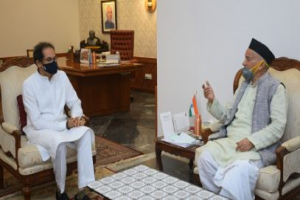Summary
The Election Commission of India has scheduled elections for Maharashtra’s Legislative Council on 21 May 2020. The state’s Chief Minister, Uddhav Thackeray, will contest the election with the intention of meeting the deadline of becoming a legislator, which is mandatory for ministerial positions. However, the Maharashtra Governor’s role in delaying the election has caused controversy.
A political and constitutional crisis, involving Maharashtra’s Chief Minister Uddhav Thackeray, seems to have been averted. Thackeray is currently not a legislator and, under India’s constitutional provisions, needs to be elected to the state’s directly-elected Legislative Assembly or indirectly-elected Legislative Council within six months of his appointment to continue as chief minister. The deadline for the process to be completed is 28 May 2020 failing which Thackeray would have to step down from the post. Before the COVID-19 pandemic struck India, Thackeray intended to get elected to the Legislative Council in an election to be held on 26 March 2020. However, the polls have since been postponed in the wake of the pandemic. The state Cabinet had twice passed a resolution requesting the Maharashtra Governor, Bhagat Singh Koshiyari, to send Thackeray as the governor’s nominee to the Legislative Council but Koshiyari had been dragging his feet.
The Indian Election Commission (EC) has now announced polls to nine vacant legislative council seats in Maharashtra on 21 May 2020, giving Thackeray an opportunity to become a legislator within the prescribed deadline. The EC took the decision following a letter dated 30 April 2020 from the Maharashtra government in which it was stated that the elections to the legislative council seats could be held in a safe environment. The EC also received a letter the same day from the Maharashtra governor to conduct elections in the state. Interestingly, the governor’s letter came after Thackeray had called Prime Minister Narendra Modi on 28 April 2020 requesting his intervention on the election.
Spotlight on the Governors
While a political crisis has been prevented, the Maharashtra incident once again threw the spotlight on the post of state governors and whether they play a partisan role. That Koshiyari purportedly chose to act only after Thackeray sought Modi’s assistance was a reminder that governors, more often than not, do the central government’s bidding. This has to do with the nature of appointments for the governor’s position. From the time of the Congress’s hegemony in Indian politics, it has been customary for the Centre to usually appoint party loyalists to the governor’s position. The Bharatiya Janata Party (BJP) has followed this practice.
An overwhelming majority of the current governors of the states, as well as lieutenant governors in the Union Territories, are either from the BJP or its affiliate organisations. As many as 11 of them are members of the Rashtriya Swayamsevak Sangh (RSS), the BJP’s ideological mentor. Koshiyari is no exception. He is a RSS veteran who was the BJP’s chief minister in Uttarakhand as well as a member of parliament on a BJP ticket. The tenure of Koshiyari, who was appointed as governor of Maharashtra in September 2019, has been a controversial one. Following the Maharashtra Assembly election in 2019, Koshiyari, on 23 November 2019, administered oath to the outgoing BJP Chief Minister Devendra Fadnavis in the wee hours of the morning without ascertaining whether he had the numbers to form the government. The decision was challenged in the Supreme Court which ordered a trust vote leading to Fadnavis’s resignation.
If Koshiyari’s brief tenure has been dogged by controversy, most of the governors in states ruled by non-BJP parties are at loggerheads with the chief ministers. West Bengal Governor Jagdeep Dhankad has had a running feud with the state’s Chief Minister, Mamata Banerjee, ever since he went to the state in 2019. Puducherry’s Lieutenant Governor, Kiran Bedi, has had a strained relationship with the Congress Chief Minister, V Narayanasamy. The situation has worsened to the extent that Narayanasamy wrote to India’s president to remove the “autocratic” Lieutenant Governor. There are others like Tripura Governor Tathagata Roy, who has made no secret of his political views and repeatedly courted controversy.
Since the governors are appointed by India’s president – on the advice of the party in power at the Centre – and continue in office “during the pleasure of the president”, as per Articles 155 and 156 of the Indian Constitution, they usually toe the Centre’s line.
Need For Change?
During the drafting of the Indian Constitution, B R Ambedkar had put forward a proposal that the governor should be nominated by the president from among a panel elected by the provincial legislatures or state assemblies. However, that proposal never made it to the Constitution. Subsequently, several state-appointed commissions have recommended changes to the way governors are appointed. The first Administrative Reforms Commission in 1969 said that while the appointment should remain the discretion of the Centre, chief ministers of respective states should be consulted. The Sarkaria Committee on centre-state relations recommended in 1988 that only eminent persons who had not taken part in politics “in the recent past” should be appointed governors. More recently, the Justice M M Puncchi Committee lamented that people “unworthy of holding such high constitutional positions” were being appointed as governors.
In light of the spate of controversies around governors, it is time to rethink and reform the constitutional position. If it continues ending up being an extension of the central government, there is also a need to debate the necessity of the post.
. . . . .
Dr Ronojoy Sen is a Senior Research Fellow and Research Lead (Politics, Society and Governance) at the Institute of South Asian Studies (ISAS), an autonomous research institute at the National University of Singapore (NUS). He can be contacted at isasrs@nus.edu.sg. The author bears full responsibility for the facts cited and opinions expressed in this paper.
-
 More From :
More From :
-
 Tags :
Tags :
-
 Download PDF
Download PDF



